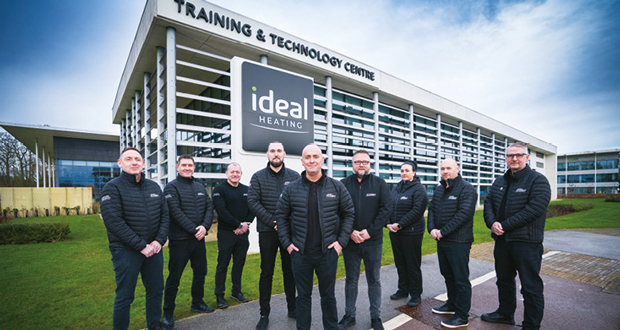Andrew Johnson, Training & Design Services Director, Ideal Heating Commercial, advises that when it comes to commercial heating courses choose your training wisely
Training has always been important when it comes to heating, not least of all because of the dangers associated with working with gas, the traditionally dominant heating fuel in the UK. With the move towards decarbonisation manifesting in a transition to heat pumps, good training is more important than ever. That training could take the form of a CPD on understanding the principles of heat pump technology through to specific product training addressing maintenance.
Commercial heating training courses are abundant. Unless there is a specific manufacturer’s product you want to train on, how do you choose a training course and provider that is right for you? Here, we look at the key aspects to consider when selecting a training course and training provider.
EXPERTISE & KNOWLEDGE
By far the most important aspect of any training is the level of expertise and knowledge of the training providers. The training course needs to be both written and delivered by people who have direct experience in the heating industry. Knowledge or qualifications in training techniques and knowledge transfer is as equally important. For maintenance-based training, ideally the trainers will have a background in heating engineering. This enables them to not only cover the core content of a training course but also address how it applies in real working-life situations.
ON-SITE FACILITIES
The environment in which you learn plays an important role in the success (or otherwise) of the training itself, which is often overlooked.
Being in a comfortable environment free from distractions will support you to better focus on your learning. Is the training held in a dedicated training centre or a makeshift back office room? Is it a comfortable environment in terms of seating, desks, heating/air conditioning? Is the presentation equipment up to scratch? But most important of all, is the heating equipment you are learning about present, and is it functional?
At our Training and Technology Centres, we provide learners with on-site access to a range of commercial heating equipment, including a unique thermodynamic heat pump simulator where they can view the change of state of refrigerant when in operation. Hands-on training is vital as it enables more learning by doing and problem solving, and therefore greater depths of understanding can be gained. In our feedback surveys this comes up as one of the most important and popular aspects. It’s one thing to have something presented to you, but to be able to work through scenarios with expert support is quite another.
LOCATION
We’ve looked at the importance of how a training course is delivered, but where it is delivered also has a role to play. Does the training provider have training facilities nationwide, or in just one location? The latter could make for long travel times and even an overnight stay. Look for training facilities located around the UK.
Lastly, not all training needs to be done in person. A CIBSE-approved CPD, for example, doesn’t require hands-on training. In these instances, online training is a good, convenient option. Will the training provider be able to deliver this and how? Is it just a PowerPoint presentation, or are other elements included such as video, attendee tasks etc.?
RANGE OF COURSES AND DELIVERY
Having a range of courses is obviously important in that it provides you with choice and allows you to fill in the gaps of your knowledge, as well as learning about emerging technologies and best practice.
A good training provider will also provide a flexible delivery model to meet individual learner needs and to support those with learning difficulties.
ENDORSEMENT
While it’s important to do your own ‘homework’ on training providers, third party endorsements are very useful. These come in different forms, from customer feedback (there are plenty of forums that provide you with the opportunity to ask for feedback), through to recognised industry awards, and independent assessment.
COST
The last aspect I want to touch on when it comes to training is cost. How much should you pay for training? You should really consider the value you believe will be returned from the programme and provider you choose. If you are going to benefit from state-of-the-art facilities, you may probably expect that that experience may cost more than somewhere very simple and basic. Training providers are businesses, and the good ones do invest heavily in facilities and staff development.
As a manufacturer we strongly believe that our training services are part of what we deliver in our product sales. For this reason, we provide many of our training programmes for free or at very low cost, despite the significant investment into our resources.
CHOOSE WISELY
Taking time out from your busy schedule to dedicate to training is an investment, financially in some cases, so selecting your training course wisely to maximise that investment is sensible.





